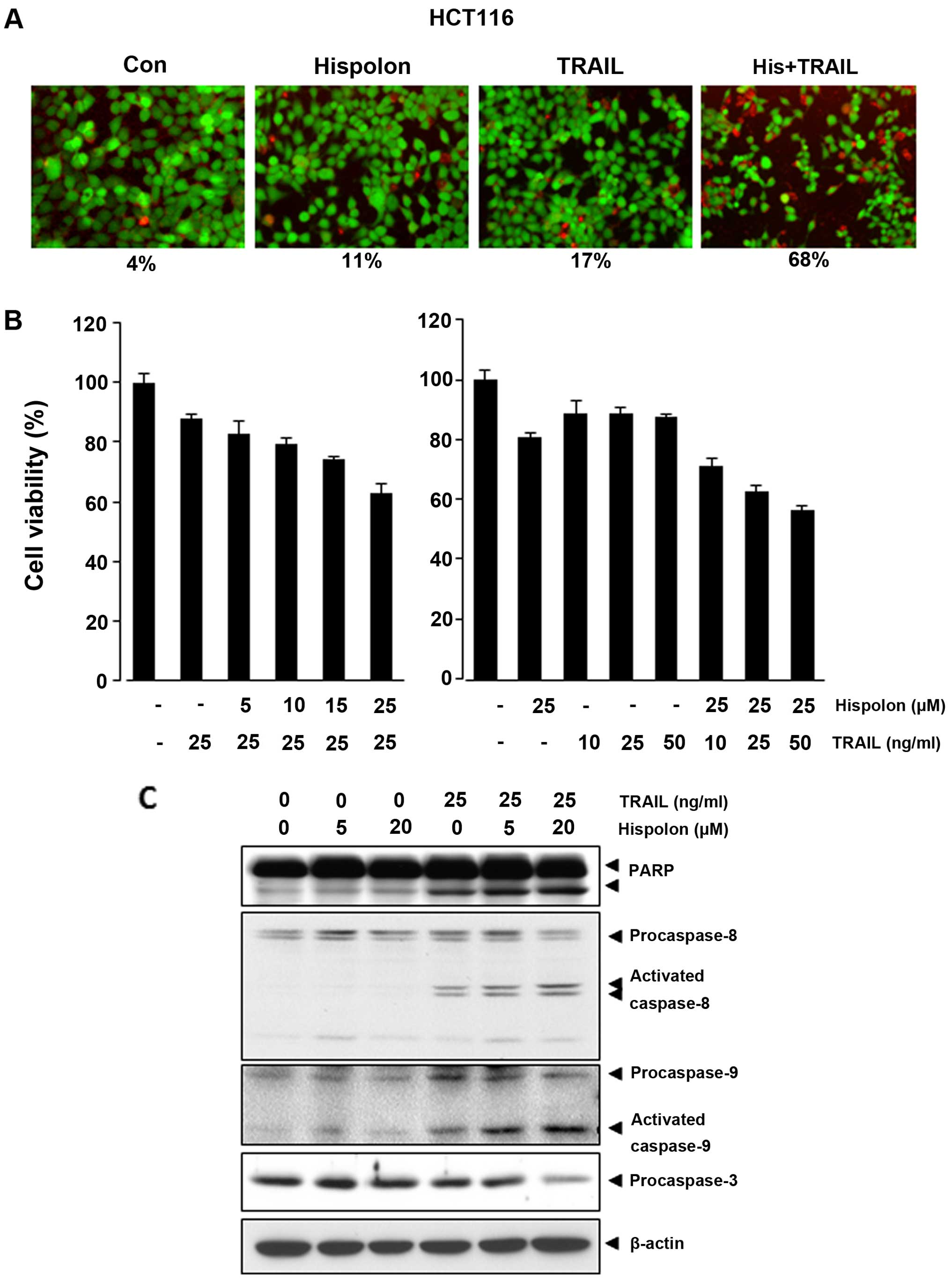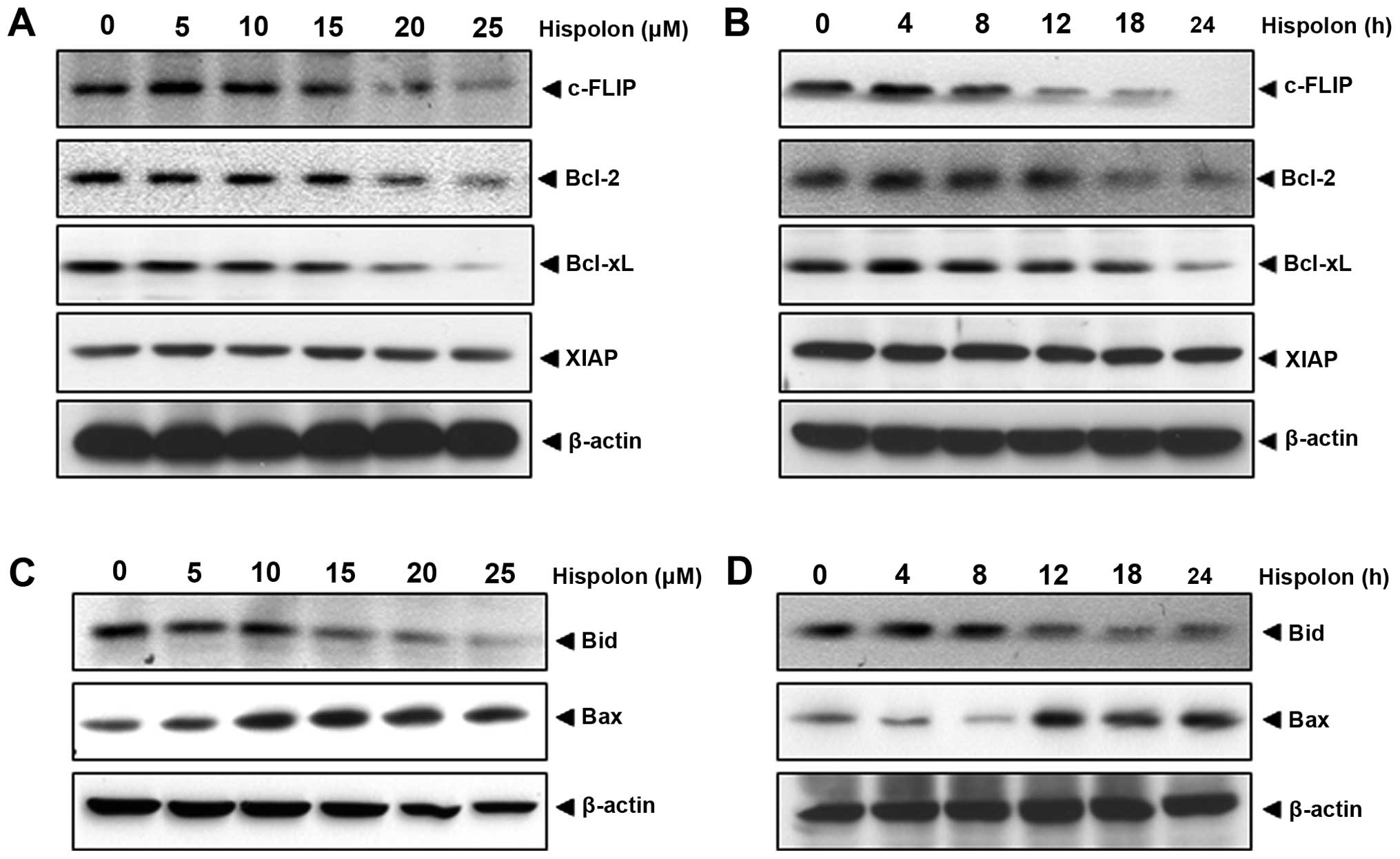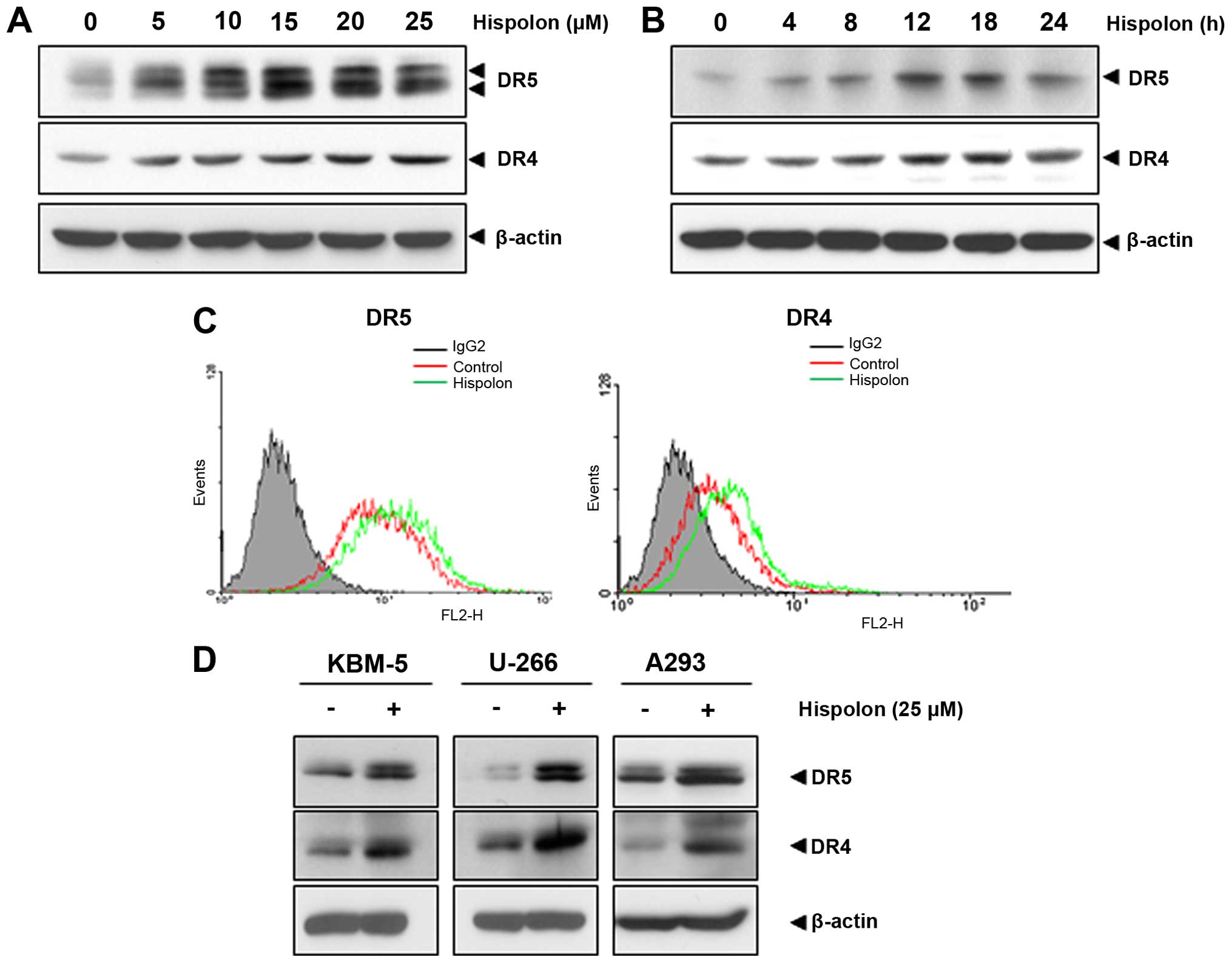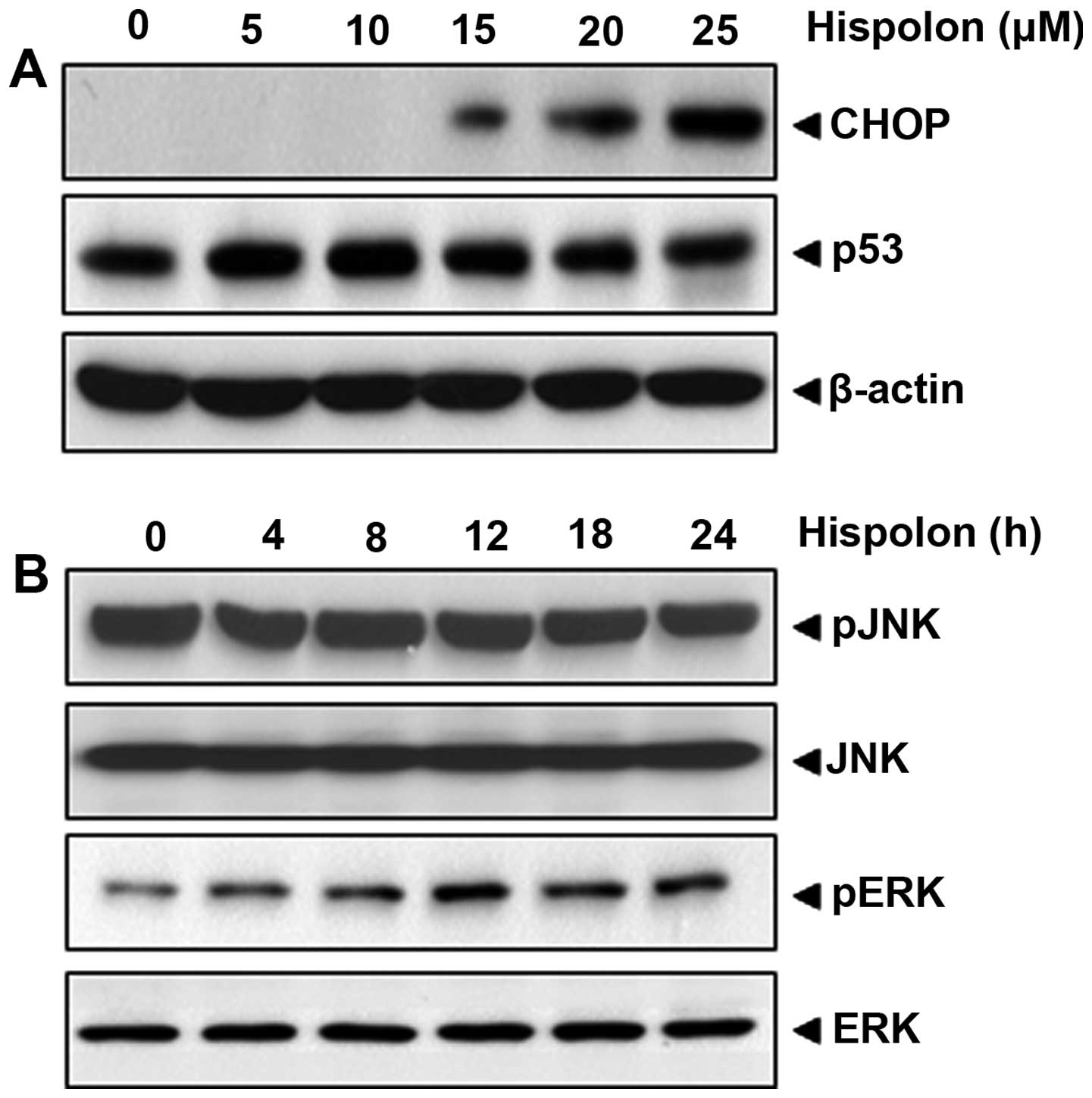|
1
|
Jemal A, Bray F, Center MM, Ferlay J, Ward
E and Forman D: Global cancer statistics. CA Cancer J Clin.
61:69–90. 2011. View Article : Google Scholar : PubMed/NCBI
|
|
2
|
Hanahan D and Weinberg RA: Hallmarks of
cancer: The next generation. Cell. 144:646–674. 2011. View Article : Google Scholar : PubMed/NCBI
|
|
3
|
Pitti RM, Marsters SA, Ruppert S, Donahue
CJ, Moore A and Ashkenazi A: Induction of apoptosis by Apo-2
ligand, a new member of the tumor necrosis factor cytokine family.
J Biol Chem. 271:12687–12690. 1996. View Article : Google Scholar : PubMed/NCBI
|
|
4
|
Wiley SR, Schooley K, Smolak PJ, Din WS,
Huang CP, Nicholl JK, Sutherland GR, Smith TD, Rauch C, Smith CA,
et al: Identification and characterization of a new member of the
TNF family that induces apoptosis. Immunity. 3:673–682. 1995.
View Article : Google Scholar : PubMed/NCBI
|
|
5
|
Tanaka M, Suda T, Yatomi T, Nakamura N and
Nagata S: Lethal effect of recombinant human Fas ligand in mice
pretreated with Propionibacterium acnes. J Immunol. 158:2303–2309.
1997.PubMed/NCBI
|
|
6
|
Walczak H, Degli-Esposti MA, Johnson RS,
Smolak PJ, Waugh JY, Boiani N, Timour MS, Gerhart MJ, Schooley KA,
Smith CA, et al: TRAIL-R2: A novel apoptosis-mediating receptor for
TRAIL. EMBO J. 16:5386–5397. 1997. View Article : Google Scholar : PubMed/NCBI
|
|
7
|
French LE and Tschopp J: The TRAIL to
selective tumor death. Nat med. 5:146–147. 1999. View Article : Google Scholar : PubMed/NCBI
|
|
8
|
Gura T: How TRAIL kills cancer cells, but
not normal cells. Science. 277:7681997. View Article : Google Scholar : PubMed/NCBI
|
|
9
|
Walczak H, Miller RE, Ariail K, Gliniak B,
Griffith TS, Kubin M, Chin W, Jones J, Woodward A, Le T, et al:
Tumoricidal activity of tumor necrosis factor-related
apoptosis-inducing ligand in vivo. Nat Med. 5:157–163. 1999.
View Article : Google Scholar : PubMed/NCBI
|
|
10
|
Bhardwaj A and Aggarwal BB:
Receptor-mediated choreography of life and death. J Clin Immunol.
23:317–332. 2003. View Article : Google Scholar : PubMed/NCBI
|
|
11
|
Doi T, Murakami H, Ohtsu A, Fuse N,
Yoshino T, Yamamoto N, Boku N, Onozawa Y, Hsu CP, Gorski KS, et al:
Phase 1 study of conatumumab, a pro-apoptotic death receptor 5
agonist antibody, in Japanese patients with advanced solid tumors.
Cancer Chemother Pharmacol. 68:733–741. 2011. View Article : Google Scholar
|
|
12
|
Maksimovic-Ivanic D, Stosic-Grujicic S,
Nicoletti F and Mijatovic S: Resistance to TRAIL and how to
surmount it. Immunol Res. 52:157–168. 2012. View Article : Google Scholar : PubMed/NCBI
|
|
13
|
Fulda S, Küfer MU, Meyer E, Van Valen F,
Dockhorn-Dworniczak B and Debatin KM: Sensitization for death
receptor- or drug-induced apoptosis by re-expression of caspase-8
through demethylation or gene transfer. Oncogene. 20:5865–5877.
2001. View Article : Google Scholar : PubMed/NCBI
|
|
14
|
Eggert A, Grotzer MA, Zuzak TJ, Wiewrodt
BR, Ho R, Ikegaki N and Brodeur GM: Resistance to tumor necrosis
factor-related apoptosis-inducing ligand (TRAIL)-induced apoptosis
in neuroblastoma cells correlates with a loss of caspase-8
expression. Cancer Res. 61:1314–1319. 2001.PubMed/NCBI
|
|
15
|
Bodmer JL, Holler N, Reynard S,
Vinciguerra P, Schneider P, Juo P, Blenis J and Tschopp J: TRAIL
receptor-2 signals apoptosis through FADD and caspase-8. Nat Cell
Biol. 2:241–243. 2000. View
Article : Google Scholar : PubMed/NCBI
|
|
16
|
Tepper CG and Seldin MF: Modulation of
caspase-8 and FLICE-inhibitory protein expression as a potential
mechanism of Epstein-Barr virus tumorigenesis in Burkitt's
lymphoma. Blood. 94:1727–1737. 1999.PubMed/NCBI
|
|
17
|
Okano H, Shiraki K, Inoue H, Kawakita T,
Yamanaka T, Deguchi M, Sugimoto K, Sakai T, Ohmori S, Fujikawa K,
et al: Cellular FLICE/caspase-8-inhibitory protein as a principal
regulator of cell death and survival in human hepatocellular
carcinoma. Lab Invest. 83:1033–1043. 2003. View Article : Google Scholar : PubMed/NCBI
|
|
18
|
Schimmer AD, Welsh K, Pinilla C, Wang Z,
Krajewska M, Bonneau MJ, Pedersen IM, Kitada S, Scott FL,
Bailly-Maitre B, et al: Small-molecule antagonists of apoptosis
suppressor XIAP exhibit broad antitumor activity. Cancer Cell.
5:25–35. 2004. View Article : Google Scholar : PubMed/NCBI
|
|
19
|
Ricci MS, Kim SH, Ogi K, Plastaras JP,
Ling J, Wang W, Jin Z, Liu YY, Dicker DT, Chiao PJ, et al:
Reduction of TRAIL-induced Mcl-1 and cIAP2 by c-Myc or sorafenib
sensitizes resistant human cancer cells to TRAIL-induced death.
Cancer Cell. 12:66–80. 2007. View Article : Google Scholar : PubMed/NCBI
|
|
20
|
Ravi R and Bedi A: Requirement of BAX for
TRAIL/Apo2L-induced apoptosis of colorectal cancers: Synergism with
sulindac-mediated inhibition of Bcl-xL. Cancer Res. 62:1583–1587.
2002.PubMed/NCBI
|
|
21
|
Hinz S, Trauzold A, Boenicke L, Sandberg
C, Beckmann S, Bayer E, Walczak H, Kalthoff H and Ungefroren H:
Bcl-xL protects pancreatic adenocarcinoma cells against CD95- and
TRAIL-receptor-mediated apoptosis. Oncogene. 19:5477–5486. 2000.
View Article : Google Scholar : PubMed/NCBI
|
|
22
|
Kandasamy K, Srinivasula SM, Alnemri ES,
Thompson CB, Korsmeyer SJ, Bryant JL and Srivastava RK: Involvement
of proapoptotic molecules Bax and Bak in tumor necrosis
factor-related apoptosis-inducing ligand (TRAIL)-induced
mitochondrial disruption and apoptosis: Differential regulation of
cytochrome c and Smac/DIABLO release. Cancer Res. 63:1712–1721.
2003.PubMed/NCBI
|
|
23
|
Huang GJ, Deng JS, Chiu CS, Liao JC, Hsieh
WT, Sheu MJ and Wu CH: Hispolon protects against acute liver damage
in the rat by inhibiting lipid peroxidation, proinflammatory
cytokine, and oxidative stress and downregulating the expressions
of iNOS, COX-2, and MMP-9. Evid Based Complement Alternat med.
2012:4807142012. View Article : Google Scholar
|
|
24
|
Chien YC, Huang GJ, Cheng HC, Wu CH and
Sheu MJ: Hispolon attenuates balloon-injured neointimal formation
and modulates vascular smooth muscle cell migration via AKT and ERK
phosphorylation. J Nat Prod. 75:1524–1533. 2012. View Article : Google Scholar : PubMed/NCBI
|
|
25
|
Ali NA, Lüdtke J, Pilgrim H and Lindequist
U: Inhibition of chemiluminescence response of human mononuclear
cells and suppression of mitogen-induced proliferation of spleen
lymphocytes of mice by hispolon and hispidin. Pharmazie.
51:667–670. 1996.PubMed/NCBI
|
|
26
|
Lu TL, Huang GJ, Lu TJ, Wu JB, Wu CH, Yang
TC, Iizuka A and Chen YF: Hispolon from Phellinus linteus has
antiproliferative effects via MDM2-recruited ERK1/2 activity in
breast and bladder cancer cells. Food Chem Toxicol. 47:2013–2021.
2009. View Article : Google Scholar : PubMed/NCBI
|
|
27
|
Huang GJ, Deng JS, Huang SS and Hu ML:
Hispolon induces apoptosis and cell cycle arrest of human
hepatocellular carcinoma Hep3B cells by modulating ERK
phosphorylation. J Agric Food Chem. 59:7104–7113. 2011. View Article : Google Scholar : PubMed/NCBI
|
|
28
|
Chen W, Zhao Z, Li L, Wu B, Chen SF, Zhou
H, Wang Y and Li YQ: Hispolon induces apoptosis in human gastric
cancer cells through a ROS-mediated mitochondrial pathway. Free
Radic Biol Med. 45:60–72. 2008. View Article : Google Scholar : PubMed/NCBI
|
|
29
|
Huang GJ, Yang CM, Chang YS, Amagaya S,
Wang HC, Hou WC, Huang SS and Hu ML: Hispolon suppresses SK-Hep1
human hepatoma cell metastasis by inhibiting matrix
metallo-proteinase-2/9 and urokinase-plasminogen activator through
the PI3K/Akt and ERK signaling pathways. J Agric Food Chem.
58:9468–9475. 2010. View Article : Google Scholar : PubMed/NCBI
|
|
30
|
Chen W, He FY and Li YQ: The apoptosis
effect of hispolon from Phellinus linteus (Berkeley & Curtis)
Teng on human epidermoid KB cells. J Ethnopharmacol. 105:280–285.
2006. View Article : Google Scholar : PubMed/NCBI
|
|
31
|
Sung B, Park B, Yadav VR and Aggarwal BB:
Celastrol, a triterpene, enhances TRAIL-induced apoptosis through
the downregulation of cell survival proteins and upregulation of
death receptors. J Biol Chem. 285:11498–11507. 2010. View Article : Google Scholar : PubMed/NCBI
|
|
32
|
Yoshida T, Shiraishi T, Nakata S, Horinaka
M, Wakada M, Mizutani Y, Miki T and Sakai T: Proteasome inhibitor
MG132 induces death receptor 5 through CCAAT/enhancer-binding
protein homologous protein. Cancer Res. 65:5662–5667. 2005.
View Article : Google Scholar : PubMed/NCBI
|
|
33
|
Yamaguchi H and Wang HG: CHOP is involved
in endoplasmic reticulum stress-induced apoptosis by enhancing DR5
expression in human carcinoma cells. J Biol Chem. 279:45495–45502.
2004. View Article : Google Scholar : PubMed/NCBI
|
|
34
|
Ichijo H: From receptors to
stress-activated MAP kinases. Oncogene. 18:6087–6093. 1999.
View Article : Google Scholar : PubMed/NCBI
|
|
35
|
Sarker M, Ruiz-Ruiz C and López-Rivas A:
Activation of protein kinase C inhibits TRAIL-induced caspases
activation, mitochondrial events and apoptosis in a human leukemic
T cell line. Cell Death Differ. 8:172–181. 2001. View Article : Google Scholar : PubMed/NCBI
|
|
36
|
Ozoren N, Kim K, Burns TF, Dicker DT,
Moscioni AD and El-Deiry WS: The caspase-9 inhibitor Z-LEHD-FMK
protects human liver cells while permitting death of cancer cells
exposed to tumor necrosis factor-related apoptosis-inducing ligand.
Cancer Res. 60:6259–6265. 2000.PubMed/NCBI
|
|
37
|
Krammer PH: CD95's deadly mission in the
immune system. Nature. 407:789–795. 2000. View Article : Google Scholar : PubMed/NCBI
|
|
38
|
Cummins JM, Kohli M, Rago C, Kinzler KW,
Vogelstein B and Bunz F: X-linked inhibitor of apoptosis protein
(XIAP) is a nonredundant modulator of tumor necrosis factor-related
apoptosis-inducing ligand (TRAIL)-mediated apoptosis in human
cancer cells. Cancer Res. 64:3006–3008. 2004. View Article : Google Scholar : PubMed/NCBI
|
|
39
|
Lee TJ, Lee JT, Park JW and Kwon TK:
Acquired TRAIL resistance in human breast cancer cells are caused
by the sustained cFLIP(L) and XIAP protein levels and ERK
activation. Biochem Biophys Res Commun. 351:1024–1030. 2006.
View Article : Google Scholar : PubMed/NCBI
|
|
40
|
Chawla-Sarkar M, Bae SI, Reu FJ, Jacobs
BS, Lindner DJ and Borden EC: Downregulation of Bcl-2, FLIP or IAPs
(XIAP and survivin) by siRNAs sensitizes resistant melanoma cells
to Apo2L/TRAIL-induced apoptosis. Cell Death Differ. 11:915–923.
2004. View Article : Google Scholar : PubMed/NCBI
|
|
41
|
Ravindran J, Subbaraju GV, Ramani MV, Sung
B and Aggarwal BB: Bisdemethylcurcumin and structurally related
hispolon analogues of curcumin exhibit enhanced prooxidant,
anti-proliferative and anti-inflammatory activities in vitro.
Biochem Pharmacol. 79:1658–1666. 2010. View Article : Google Scholar : PubMed/NCBI
|
|
42
|
Sung YH, Park KH, Lee YB, Park HM, Shin
DJ, Park JS, Oh MS, Ma HI, Yu KH, Kang SY, et al: Midbrain atrophy
in subcortical ischemic vascular dementia. J Neurol. 256:1997–2002.
2009. View Article : Google Scholar : PubMed/NCBI
|
|
43
|
Gupta SC, Francis SK, Nair MS, Mo YY and
Aggarwal BB: Azadirone, a limonoid tetranortriterpene, induces
death receptors and sensitizes human cancer cells to tumor necrosis
factor-related apoptosis-inducing ligand (TRAIL) through a p53
protein-independent mechanism: Evidence for the role of the
ROS-ERK-CHOP-death receptor pathway. J Biol Chem. 288:32343–32356.
2013. View Article : Google Scholar : PubMed/NCBI
|
|
44
|
Ravi R, Bedi GC, Engstrom LW, Zeng Q,
Mookerjee B, Gélinas C, Fuchs EJ and Bedi A: Regulation of death
receptor expression and TRAIL/Apo2L-induced apoptosis by NF-kappaB.
Nat Cell Biol. 3:409–416. 2001. View
Article : Google Scholar : PubMed/NCBI
|
|
45
|
Shenoy K, Wu Y and Pervaiz S: LY303511
enhances TRAIL sensitivity of SHEP-1 neuroblastoma cells via
hydrogen peroxide-mediated mitogen-activated protein kinase
activation and upregulation of death receptors. Cancer Res.
69:1941–1950. 2009. View Article : Google Scholar : PubMed/NCBI
|
|
46
|
Wu GS, Burns TF, McDonald ER III, Jiang W,
Meng R, Krantz ID, Kao G, Gan DD, Zhou JY, Muschel R, et al:
KILLER/DR5 is a DNA damage-inducible p53-regulated death receptor
gene. Nat genet. 17:141–143. 1997. View Article : Google Scholar : PubMed/NCBI
|
|
47
|
Lu M, Xia L, Hua H and Jing Y:
Acetyl-keto-beta-boswellic acid induces apoptosis through a death
receptor 5-mediated pathway in prostate cancer cells. Cancer Res.
68:1180–1186. 2008. View Article : Google Scholar : PubMed/NCBI
|
|
48
|
Yodkeeree S, Sung B, Limtrakul P and
Aggarwal BB: Zerumbone enhances TRAIL-induced apoptosis through the
induction of death receptors in human colon cancer cells: Evidence
for an essential role of reactive oxygen species. Cancer Res.
69:6581–6589. 2009. View Article : Google Scholar : PubMed/NCBI
|


















